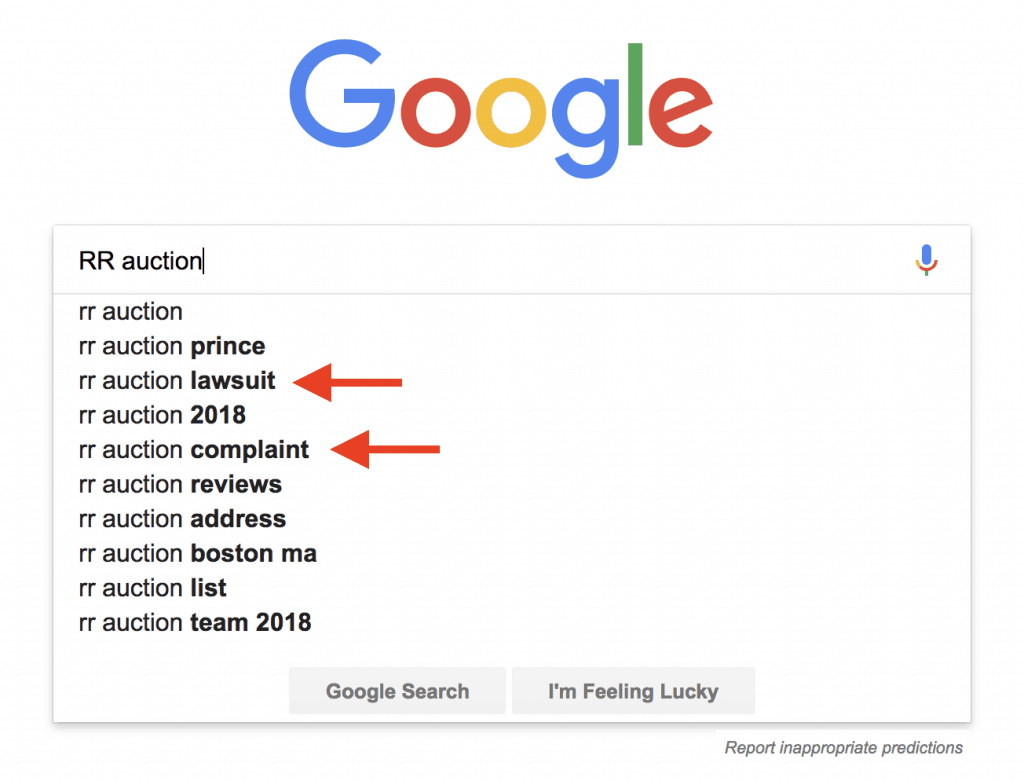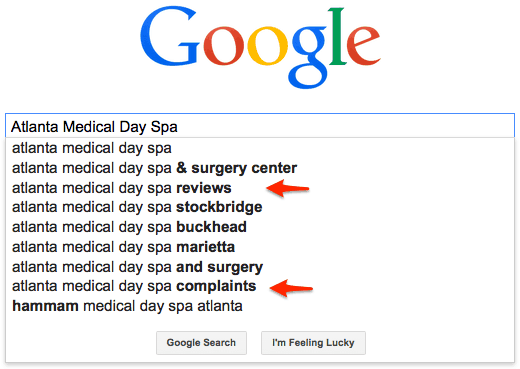How Google Search AutoComplete Affects Your Reputation
Google Search AutoComplete Suggestions impacts how people see your brand
When you type something in Google Search, you may have seen a drop-down of suggestions of Google, based on your search term. These are Google Search AutoComplete suggestions and regularly display damaging suggestions. But how does Google come up with these suggestions and can they be removed?

How AutoComplete Suggestions works
The suggestions that Google offers are based on several factors.
#1. What you search for
The typed term will determine what you will see as it tells Google what you are looking for. If you are searching for SEO, Google will show the popular suggestions for SEO.
#2. What other people search for
For example, type in the word “discount,” and Google suggests:
• coupon deals
• coupon code
• coupon dominos
These are all real searches that have been done by other people. Popularity is a factor in what Google shows. If lots of people who start typing in “coupon” then go on to type “coupons dominos,” that can help make “coupon dominos” appear as a suggestion.
#3. Your Search History
Your previous searches also impact the suggestions. Especially if you are logged into Google Account and have enabled Search History. In which case, you will find suggestions based on your previous searches.
#4. Where you are located
The area you are from is an important factor too. Google also shows suggestions, based on regional statistics of searches. For example, if you search for “restaurants” your suggestions will likely show names in your area.
Google Search AutoComplete’s Impact On Your Reputation
Google’s Autocomplete function is used by many on a regular basis. The study of Rosetta, back in 2011, found AutoComplete to be the most used feature in an eye-tracking study. People used the suggestions to correct spelling mistakes and to go deeper into certain searches.
In many cases, Google Search AutoComplete suggests “…. reviews” and “….complaints” for both professional individuals as brand names. As you can imagine, if someone is googling your brand and notices “complaints”, it is very likely will be drawn to see what those complaints are about. If you see your reputation issues already reflected in AutoComplete, it’s crucial to take control.
Can You Request Removals?
Research by the Observer has shown that Google Search AutoComplete is drawn to negativity. So if you are dealing with negative suggestions for your name or brand, you might want to have those removed. Google does change and removes suggestions, but for very specific reasons only. Google stated it will remove suggestions in case of:
• Hate or violence related suggestions
• Personally identifiable information in suggestions
• Porn & adult-content related suggestions
• Legally mandated removals
• Piracy-related suggestions
Google doesn’t even have a removal request form available, only a help page on the issue which tells you to leave comments in the support forums.
The reason Google doesn’t easily remove suggestions is that “a lot of times people are searching for it, and there’s a legitimate reason” according to Jonathan Effrat, product manager at Google. The majority of Autocomplete suggestions are unflattering rather than inappropriate, so removal does not happen often.
Can Google AutoComplete Suggestions Be Manipulated?
In the past, we were able to manipulate Google’s Auto-Suggest pop-ups. Unfortunately, this is almost impossible without very considerable financial investment today. Even so, results are not guaranteed.
We have found that the best approach is to take positive control of the search result pages that are displayed by Google when a prospective client takes on one of the dangerous Auto-Suggest phrases. Usually, that is the phrase that ends in “reviews.” It seems that Google recognizes proper nouns that are associated with businesses, such as their brands, trademarks, and products.

Even if the public is not deliberately searching for “COMPANY NAME REVIEWS”, Google is most likely automatically suggesting this. Our founder Michael recognized this as early as 2012, and revealed how Google benefits financially from deliberately drawing attention to unfavorable allegations about businesses; even if they are not true. You can watch his video here:
How To Protect Your Brand
1.Take action
If someone says something negative about you or your brand, it’s likely this review will show in searches. As a result, people Googling you will see the negative feedback as well. In this case, the best option is to build a reputation buffer where you expand your website, social media profiles and spread positive content on the internet such as blogs, press releases etc.
We always urge people to start this reputation buffer BEFORE there are negative issues online. By creating this buffer, future negative posts are less likely to rank high in Google due to your highly positive presence.
2.Monitor your results
Monitoring takes time and effort but can be crucial for reputation management. When monitoring your search results and what people say about you, you can tackle a problem at an early stage. Negative review? Respond in the appropriate manner. Perform search phrases research to find reputation issues. There are multiple monitoring tools available to make this as easy as possible for yourself. Another important step in monitoring is to set up Google Alerts to be notified when you are mentioned online
3.Hire professionals
Bad reviews, negative mentions in AutoComplete, it all has a high potential for affecting or even ruining your business. If your online issues are getting out of hand, it’s time to ask professionals for help.
 Page1.me
Page1.me